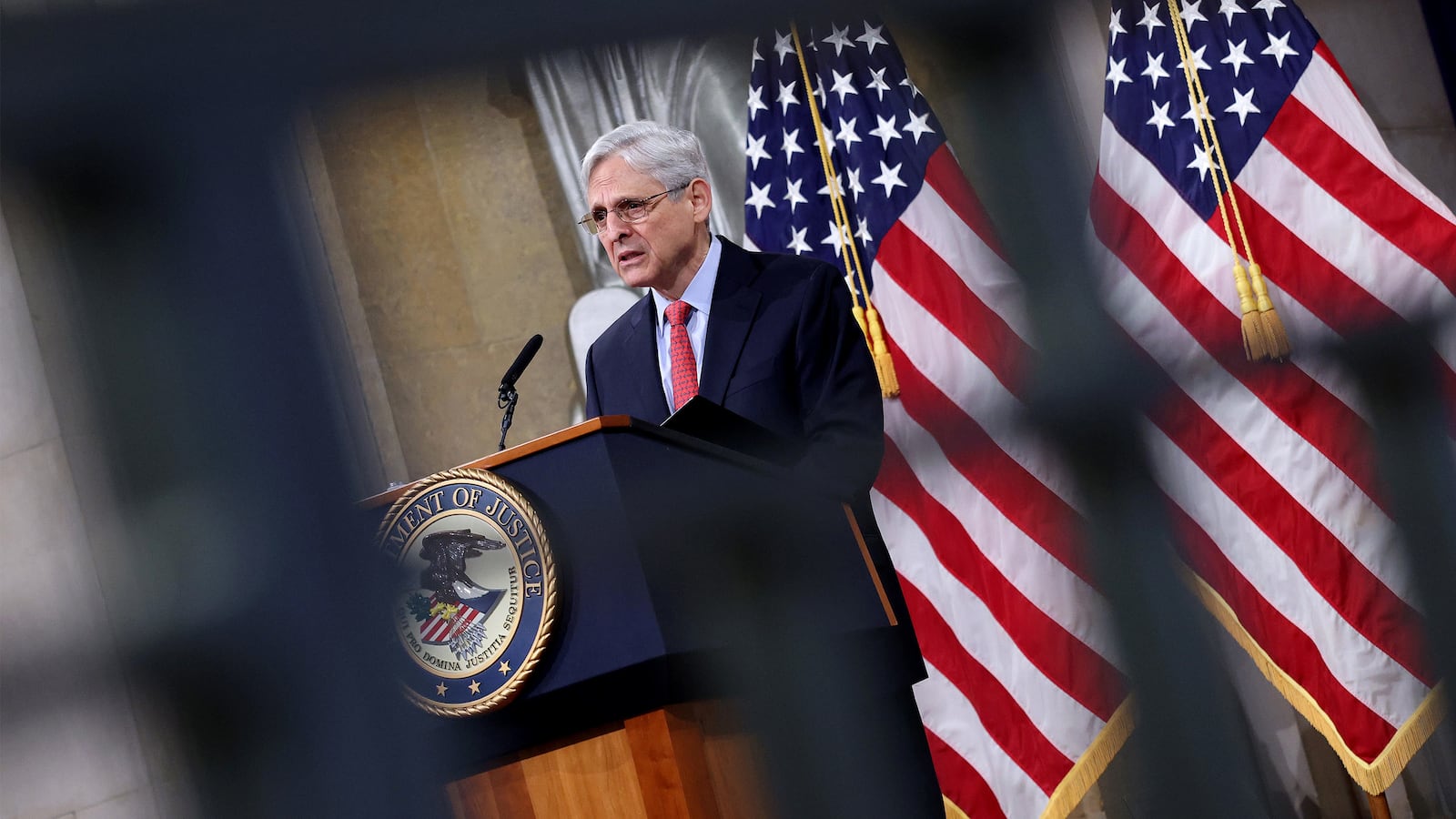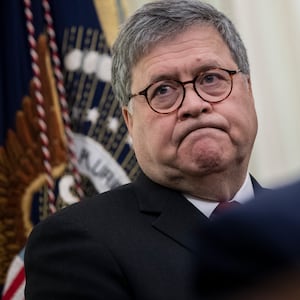Some liberals are furious with Attorney General Merrick Garland as the Department of Justice defends laws that they oppose and individuals they abhor, including Donald Trump.
Some of the criticisms arise from a misunderstanding of the foundational obligations of the DOJ to defend the laws of the United States—including those at odds with the policies of the current administration.
That does not mean, however, that the DOJ under Garland should defend every position taken by the Trump-era Department, which was marked by mendacity and a disregard for the rule of law.
To restore the DOJ’s badly damaged credibility and authority, Garland must affirmatively reject the bad faith that William Barr and Jeff Sessions allowed to infect the nation’s chief law enforcement agency. Unfortunately, by battling in the courts to keep a record of Barr’s mendacity out of public view, Garland is making a serious mistake.
The DOJ has a constitutionally assigned job to defend the nation’s laws. The DOJ has an obligation to defend the nation’s laws, even the bad ones. The DOJ is currently arguing that the Supreme Court should uphold a law barring residents of Puerto Rico from receiving supplemental social security income benefits, despite Biden’s declaration that the provision is “inconsistent with my administration’s policies and values.” In another case, the DOJ had stated that the Department can “vigorously” defend a statutory exemption to certain federal civil rights laws that purportedly permits religious schools to discriminate against LGBTQ students and continued to face criticism, even after it amended its submission to contain more tempered language.
Garland’s decision to defend these laws makes some uncomfortable; but doing so is not only consonant with the duties of the executive branch, but also essential to maintain the credibility and authority of the DOJ before the courts, and the public.
Prior to the Trump administration, attorneys general serving under presidents of both parties recognized that the DOJ has “a duty to defend the constitutionality of an Act of Congress whenever a reasonable argument c[ould] be made in its support. The DOJ’s duty to defend existing statutes is part and parcel of the executive branch’s constitutionally assigned obligation to execute and enforce the nation’s laws, regardless of which party is in power. The sole exception to that duty arises in rare circumstances when the attorney general concludes there is no good-faith basis to defend the constitutionality of a law.
Under Sessions and Barr, however, the DOJ cast aside its obligations to defend laws Trump didn’t like, most notoriously by joining in a lawsuit brought by Republican attorneys general challenging the Affordable Care Act, based on a theory that Congress’ repeal of the tax penalty for failing to obtain health insurance coverage mandated the voiding of the entire Act. The argument is so weak that it’s likely to be rejected soon by the current, right wing-dominated Supreme Court. The DOJ’s message in joining the suit against a law Republicans opposed was clear: Under Trump, ideology would trump the DOJ’s constitutional obligation to enforce and defend the nation’s laws.
If the DOJ under Biden had followed the Trump administration’s lead, and continued to abdicate its obligation to defend the nation’s laws, that role would inevitably be filled by others, some with very problematic agendas. Indeed, the DOJ’s recent filing regarding the religious exemption to civil rights protections was made in response to an effort by a group representing right-wing religious institutions to intervene in the lawsuit, and effectively displace the DOJ. As Mark Joseph Stern has argued, displacing the DOJ, as the intervenors seek to do, could well lead to a catastrophic result, since right-wing groups—and a possibly number of Supreme Court justices—favor the recognition of broad, purportedly constitutionally mandated, religious exemptions that would render civil rights laws far weaker.
The interests of the nation, and of its civil rights laws, are therefore far better served by allowing the DOJ to retain the responsibility of defending those laws, rather than giving up that role to those with far less, if any, interest in preserving foundational civil rights protections.
The Department of Justice also has an obligation to defend government officials from liability, including some officials whose conduct has been abhorrent. In September 2020, Barr’s DOJ intervened in a state court lawsuit brought against Trump by E. Jean Carroll, who alleged that Trump defamed her when he falsely denied sexually assaulting her years ago.
Under federal law, the government has the authority to substitute itself as a defendant in certain civil cases seeking damages against government employees arising from conduct occurring within the scope of the officials’ employment, and to transfer all such cases to federal courts. Because the federal government itself is immune from defamation liability, such a substitution will generally bring a defamation action against a government employee to an end.
The definition of “scope of employment” is governed by applicable state law; and it has historically been defined, pursuant to arguments advanced by the DOJ, extremely broadly in defamation cases. This broad definition of the term has protected a wide range of government officials from defamation claims, including, recently, Senator Elizabeth Warren.
Courts have held that even false public denials of wholly personal misconduct by elected officials fall within the scope of employment. This is because constituents are concerned with such matters, even when the underlying misconduct at issue (in this case, an alleged sexual assault that occurred before Trump’s presidency) doesn’t fall within the scope of employment.
A judge ruled against the DOJ in Carroll’s case, but only after rejecting a leading appellate court decision in the area, which favored the government’s position, and also ruling, again, without substantial basis in governing law, that the president is not a “government employee” within the meaning of the applicable statute.
Under these circumstances, it was neither surprising nor improper for the DOJ to appeal the court’s decision. Doing otherwise would have required the Department to discard its own longstanding legal positions. Altering the DOJ’s longstanding legal position in the area could also result in placing other government officials at risk of liabilities they have been protected from in the past, including in cases far less freighted and controversial than Carroll’s.
Furthermore, had the DOJ chosen a case brought against Trump in which to depart from its long-standing legal positions, it would have risked appearing as politically biased, as the Department was under Sessions and Barr.
But the Department of Justice is not obliged to defend misconduct and mendacity. Unfortunately, the DOJ is currently doing just that in a case arising from the gravest falsehoods of a Trump-era attorney general.
When the DOJ’s credibility is put in question, its effectiveness, in and out of court, can be gravely compromised. That is just what happened under the tenure of Barr, who all too often served the personal interests of the president rather than fulfilling his duty to uphold the law.
A signal example of such misconduct was Barr’s misleading public account of the findings of Special Counsel Robert Mueller. On March 24, 2019, after receiving the report, Barr sent Congress a letter stating that Mueller had not obtained sufficient evidence to sustain a conviction of Trump for obstructing justice. In fact, as the nation later learned, the Mueller Report contained detailed evidence of serial acts of presidential criminality, which occurred as Trump repeatedly sought to obstruct investigations of his own misconduct and that of his cronies, including by attempting to engineer the firing of Mueller himself.
But because of Barr’s delay in releasing the report, the AG’s misleading letter stood as the public’s only account of the report for a period of weeks, thus clearing the way for Trump to falsely claim that he had been “vindicated” in the wake of a “witch hunt,” a claim he’s continued making for years, and used to blunt (and ultimately defeat) calls for his removal from office.
As has only subsequently become known, the mendacious letter was the culmination of a scheme involving Barr, together with Deputy Attorney General Rod Rosenstein and a number of other high-level DOJ officials, directed at misleading the nation about Mueller’s findings. The scope of the scheme has only come to light over time, in part as a result of demands for disclosures of DOJ documents under the Freedom of Information Act.
Under Garland, however, DOJ officials have continued to frustrate efforts to bring evidence of the scheme fully to light. Most recently, government lawyers have made misleading statements to a court as part of an effort to keep a key record of the scheme under wraps.
The document at issue is a March 2019 memo concerning the Mueller Report signed by Steven Engel, then-head of the DOJ’s Office of Legal Counsel, an office that advises government officials on complex legal issues. In his letter to Congress, Barr claimed he relied on advice from the OLC in reaching his conclusion that Trump was not a crook.
After the DOJ refused to turn over the OLC memo in response to a Freedom of Information Act request, a public interest group filed suit to compel its release. In response to the suit, DOJ lawyers filed papers representing to Judge Amy Berman Jackson that the OLC memo had been drafted to advise and assist Barr in evaluating the evidence obtained by Mueller. As such, the DOJ lawyers asserted, the document was exempt from release under the deliberative process privilege (which protects communications reflecting government officials’ decision-making) and the attorney-client privilege. The DOJ lawyers asked the judge to rely entirely on their representations about the contents of the memo, and not to review the document herself.
Judge Jackson, however, insisted on reading the memo. When she did, the judge found, as explained in a detailed opinion, that—far from being a document prepared to advise Barr in reaching a decision—the memorandum was actually drafted after Barr had decided to exonerate Trump, and was being finalized at the very same time as Barr’s mendacious letter to Congress was being drafted. Furthermore, the judge found, rather than being a document prepared to advise Barr on the legal and factual issues—in the manner of many OLC opinions—the document actually amounted to a set of talking points to assist Barr in justifying the decision he had already made to preemptively exonerate the president.
Put otherwise, DOJ lawyers lied to the court in an effort to prevent a judge from reviewing, and ordering the release of, evidence of a former attorney general’s scheme to mislead the public about a president’s criminal conduct. Nonetheless, in the face of the court’s detailed, and well supported, findings of dishonesty by DOJ lawyers, the Department, under Garland, has persisted in defending the effort to keep portions of the memo under wraps and is appealing the judge’s decision.
As Judge Jackson recounted in a ruling permitting the DOJ to keep portions of the memo to under seal while the appeal proceeds, the DOJ repeatedly had the opportunity to come clean and acknowledge the actual contents of the OLC memo, as well as the falsity of its lawyers’ accounts of it, but the Department chose not to. That is the sort of continuation of the corrosive legacy of the Trump years that the DOJ should not engage in. The DOJ should drop its appeal, as several senators made clear in a letter they sent to the attorney general earlier this week. Those senators argued that interests of transparency strongly argue against keeping the document from the public.
(I do not comment on the currently brewing controversies regarding leak-related subpoenas for communications data regarding journalists and members of Congress and their staffs in this piece, including because the facts relating to these matters, including the potential knowledge and involvement of Biden DOJ appointees, have yet to be fully disclosed.)
Barr reportedly took umbrage when Trump demanded that he go to court to defend his false claims of voter fraud in the wake of the election. Furthermore, as disclosed in some recently released emails, some of those lawyers who remained at DOJ during the final weeks of the Trump administration—including the OLC’s Engel—responded with incredulity as Trump pressured them to join in his bad faith efforts to overturn the results of the election.
Yet those DOJ officials should hardly have been surprised. Sessions, Barr and their cronies had spent years bending the law, and facts, to suit Trump’s wishes. Having made clear their willingness to act as Trump’s Roy Cohns, why were any of these officials surprised that Trump demanded g that they serve as counsel to his post-election effort to void democracy?
Barr and his cohorts left the DOJ with its credibility in shambles, and they did so at the worst possible time for the Department. Under Garland, the DOJ will have weighty responsibilities, including the obligation to vindicate civil and voting rights against attacks upon the Constitution, and democracy itself, on a scale the nation has not witnessed for the better part of a century—often before hostile courts.
At a time like this, the DOJ cannot afford to take the kind of hits to its credibility and reputation that it suffered under Trump. That makes it all the more important that the DOJ not make the kind of compromises of its duties of veracity and good faith the Department made so often under Trump.
Returning to a DOJ guided by longstanding principles will require the Department to take positions that some don’t like. So be it.
But restoring the DOJ’s credibility will require the Department’s leaders to make some hard choices, including decisions not to defend misconduct in the DOJ’s own ranks, as it is, unfortunately, doing in the OLC memo case.



